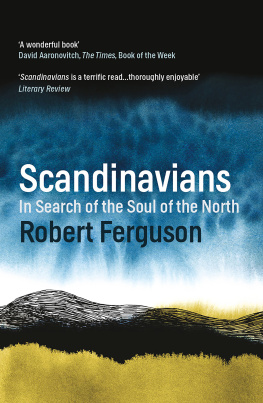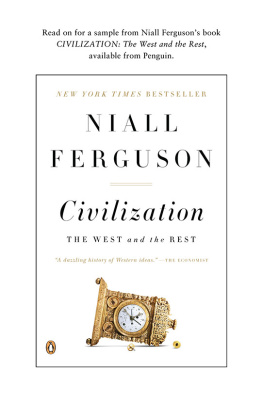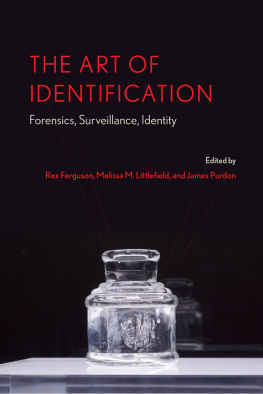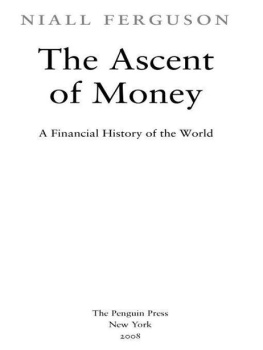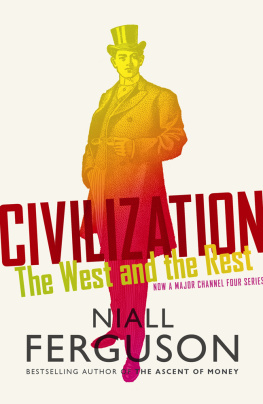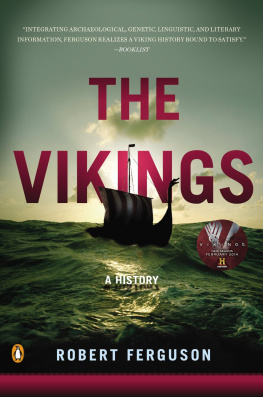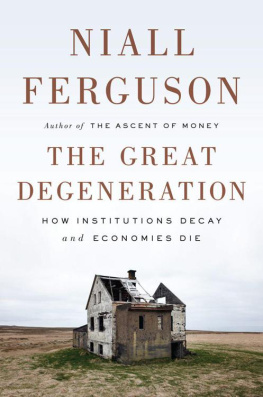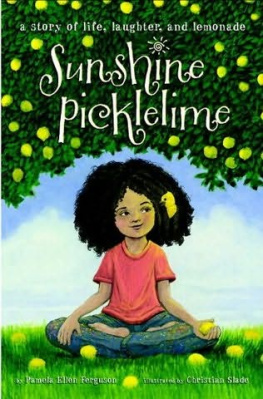Ferguson - Scandinavians
Here you can read online Ferguson - Scandinavians full text of the book (entire story) in english for free. Download pdf and epub, get meaning, cover and reviews about this ebook. City: Place of publication not identified;Scandinavia, year: 2016, publisher: Head of Zeus, genre: Detective and thriller. Description of the work, (preface) as well as reviews are available. Best literature library LitArk.com created for fans of good reading and offers a wide selection of genres:
Romance novel
Science fiction
Adventure
Detective
Science
History
Home and family
Prose
Art
Politics
Computer
Non-fiction
Religion
Business
Children
Humor
Choose a favorite category and find really read worthwhile books. Enjoy immersion in the world of imagination, feel the emotions of the characters or learn something new for yourself, make an fascinating discovery.
- Book:Scandinavians
- Author:
- Publisher:Head of Zeus
- Genre:
- Year:2016
- City:Place of publication not identified;Scandinavia
- Rating:5 / 5
- Favourites:Add to favourites
- Your mark:
- 100
- 1
- 2
- 3
- 4
- 5
Scandinavians: summary, description and annotation
We offer to read an annotation, description, summary or preface (depends on what the author of the book "Scandinavians" wrote himself). If you haven't found the necessary information about the book — write in the comments, we will try to find it.
Scandinavians — read online for free the complete book (whole text) full work
Below is the text of the book, divided by pages. System saving the place of the last page read, allows you to conveniently read the book "Scandinavians" online for free, without having to search again every time where you left off. Put a bookmark, and you can go to the page where you finished reading at any time.
Font size:
Interval:
Bookmark:

SCANDINAVIANS
Robert Ferguson
www.headofzeus.com

Tolerant, socially progressive and possessed of a gently introspective melancholia, the three Scandinavian countries have long provoked the curiosity and admiration of other European nations. But to what degree does their perception of Norway, Sweden and Denmark reflect reality?
Robert Ferguson drills down through the centuries to seek out the historical roots of these quin-tessentially Scandinavian qualities, and to explore the balance of truth and myth that they contain. The result is a treasure-trove of stories about people, places and events from Gorm the Old to the young Henrik Ibsen, from the Stockholm Bloodbath of 1520 to the mass killings in 2011 by Anders Breivik, and from Queen Kristina of Sweden to Saga Norn of The Bridge all of which enrich our understanding of modern Scandinavia.
In its authors words, Scandinavians isnt, strictly speaking, a history so much as a journey: a discursive stroll through the last thousand years of Scandinavian culture in search of the soul of the North.
For Nina
AS SOMEONE IN THIS BOOK OBSERVES , THE COUNTRY THAT I moved to in the winter of 1983 was not the real Norway. It was a nineteenth-century dream of Norway, the creation of a remarkable handful of artistic geniuses: Knut Hamsun, Henrik Ibsen, Edvard Munch and Edvard Grieg, all of whom in varying degrees I admired. It was these giants of European and world culture who first drew my attention to this tiny community in the far north of the world. That was over thirty years now, and a digitally-driven globalization means the best-kept secret in Europe is a secret no more. A brilliant but obscuring cultural layer has gradually been overlaid by the slow-motion tsunami of change.
As of this writing, Norway is one of the richest nations on earth following the discovery of North Sea oil in the 1960s, and as a result of a canniness both rural and Lutheran in investing the profits from the state-owned industry that extracts it into an investment fund currently worth in the region of 6,650 billion kroner, or 1.3 million kroner per Norwegian . This is a society so wealthy that by the early twenty-first century its indigenous working class has all but disappeared and it has been obliged to import one to build and repair its houses and flats, drive its public transport and taxis, keep its hospitals and old peoples homes open, and sweep and wash the staircases of its communal apartment blocks. Back in 1983, when I first came to live here, the housekeeping was still done by the tenants themselves according to a rota system, and woe betide you if you forgot, for the local nabokjerring , a sort of socially responsible old battle-axe-cum-gossip, would come knocking at your door and more or less drag you out by the ear to do it. Todays tenants farm the work out, and the last decade has seen a boom in cleaning agencies. Most of them are run by immigrants from Poland, Latvia, Estonia, bringing with them a Roman Catholicism that has been more or less absent from the country since the Reformation so many of them that Catholic churches struggle to cope with the demand for seats on Sundays. My morning newspaper, which was once delivered at the crack of dawn by a Norwegian schoolboy saving for his first bicycle, now comes courtesy of a mournful-looking Eritrean who is going grey at the temples. Huge numbers of young Swedes, too, have arrived in Norway over the past decade, looking for work in the numerous Starbucks-cloned coffee bars that have sprung up all over the country, 55,000 of them in the catering trade alone. They comfort themselves by making ironic comments about their only being here to take the country over again, while the Norwegians exult at finding themselves finally, after a thousand years below stairs, living upstairs in their own version of Downton Abbey , their menial needs attended to by this army of Swedes and other immigrants.
Things have changed, and before they change out of all recognition I have felt an increasing desire to look back and see if I can in some way trace the outlines of a more permanent manifestation of Scandinavian identity, or spirit, or soul or heart, whichever of those unsatisfactory terms seems most appropriate, and allow myself to ponder freely questions that I have been too busy living to ponder before, such as: Is social democracy really Lutheranism disguised as rationalism? Why are Scandinavian prisons so luxurious? Why are their prison sentences so short? Are these examples of weakness, naivety, or are they the best way forward? Why have the Swedes been neutral for the past two centuries? Is it principles, timidity or the future of mankind? Why are the social services in Scandinavia so generous? Is it wealth, decency, guilt or a combination of all three? And what, in a historical sense, has been the inner dynamic of the relationship between Danes, Norwegians and Swedes over the centuries? Greater minds than mine have addressed such matters. The nineteenth-century Norwegian playwright Henrik Ibsen once attempted to define the difference in status between the three peoples: Between us, Swedes, Danes and Norwegians, we possess all the qualities needed to form a spiritually united, single people: Swedes are our spiritual aristocracy, Denmark our spiritual bourgeoisie, and Norway our spiritual lower class. How valid was Ibsens analysis? How valid is it today? Who are the Scandinavians?
*
The sixth-century Gothic historian Jordanes saw in Scandza , by which he meant Scandinavia, the cradle of human life, a hive of nations and a womb of peoples. In the Ynglingasaga chapter of the thirteenth-century Heimskringla , his history of the kings of Norway, the Icelandic chieftain, poet and historian Snorri Sturluson writes of a tribal emigration northwards led by the great chieftain Odin from the coast of the Black Sea in the time of the Roman Empire. European Christians such as Alcuin and Asser knew the Scandinavians only as Vikings as terrorists, barbarians, thieves and conquerors; the more anthropologically objective contributions of the Arab travellers and scholars who encountered the Vikings on their travels include the observations of a fourteenth-century Syrian geographer, Shams al-din al-Dimashqi, who wrote of a Frozen Ocean that lies beyond the Qibgaq-deserts at a latitude of sixty-three degrees. Its length is an eight-day journey and its breadth three days. A great island is located in this ocean, inhabited by tall people with white skin and fair hair and blue eyes. The seventeenth-century Spaniard Baltasar Gracin, in his categorization of the differences between the three peoples, drew particular attention to a fondness for cruelty among the Swedes. Montesquieu found in the cold climate a scientific explanation for the alleged superiority of the Scandinavians in intelligence, ethical standards, and sheer intellectual and physical energy. In the Lettres sur le Nord published in 1840, the Frenchman Xavier Marmier rebuked his fellow-countrymen for the way all their knowledge of the north failed once it reached the dim fogs of the Baltic.
As the nineteenth century progressed, democracy in the Scandinavian countries took root slowly and in a more stable and less dramatic fashion than in other parts of Europe. The absence of feudalism in Sweden and Norway meant that political tensions between the social classes were fewer, and the idea of a flat and egalitarian structure a less unnatural one. Mary Wollstonecraft, in her letters home from her Scandinavian travels in 1795, praised the generally high level of education in all three countries compared with her native England. She also found that Norwegians, in the midst of what many of Norways own historians continue to refer to as the four-hundred-year night of dependence on Denmark and Sweden before the achievement of independence in 1905, seemed to her to enjoy all the blessings of freedom and a degree of equality which I have seldom seen elsewhere. A sensible, shrewd people, she called them, with little scientific knowledge, and still less taste for literature, but who appeared to her to be arriving at the epoch which precedes the introduction of the arts and sciences. The inhabitants of the double monarchy Denmark-Norway seemed to her the least oppressed people of Europe. The Swedes she found to be courteous, but with a courtesy bordering on insincerity, the effect, she maintained, of a spirit softened rather than degraded by wretchedness. A nineteenth-century visitor, Captain Charles Frankland, noted that he never saw anything yet to equal the laziness of those Swedes; they seemed to be as stupid as the Danes and twice as insolent. Writing of a trip to Sweden in 1847, the novelist Selina Bunbury was more empathically inclined, but still effortlessly convinced of the superiority of the British way of doing things. She noted the primitive nature of the agricultural methods she witnessed, and could not help thinking what a mutual-advantage system it might prove if English or Scotch farmers were encouraged to settle in this agricultural country.
Font size:
Interval:
Bookmark:
Similar books «Scandinavians»
Look at similar books to Scandinavians. We have selected literature similar in name and meaning in the hope of providing readers with more options to find new, interesting, not yet read works.
Discussion, reviews of the book Scandinavians and just readers' own opinions. Leave your comments, write what you think about the work, its meaning or the main characters. Specify what exactly you liked and what you didn't like, and why you think so.

